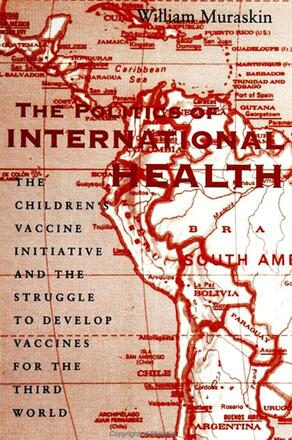
The Politics of International Health
The Children's Vaccine Initiative and the Struggle to Develop Vaccines for the Third World
Alternative formats available from:
Presents the history of the Children's Vaccine Initiative, examining its successes and failures in promoting the development of both new and improved vaccines for the Third World.
Description
Tracing the history of the Children's Vaccine Initiative (CVI), this book examines its successes and failures in promoting the development of both new and improved vaccines for the Third World. The CVI has achieved many successes, including making vaccination a top international public sector priority. Most of its failures have stemmed from the often bitter competition between the fledgling Initiative and the notoriously turf-conscious and inefficient World Health Organization (WHO), over their respective roles in championing vaccines.
Vaccines are the most inexpensive means of improving the health and lowering the mortality of people in the Third World, where infectious diseases kill millions of children every year. As a result of the biotechnology revolution, it is possible that a whole array of new vaccines can be created for diseases which are not yet preventable. What has stood in the way of this major medical breakthrough has been that vaccine "product development" has been in the hands of commercial companies, whose activities are dominated by the need for maximizing profit, which the Third World poor cannot generate.
William Muraskin is Professor of Urban Studies at Queens College, City University of New York. He is the author of The War Against Hepatitis B: A History of the International Task Force on Hepatitis B Immunization and Middle Class Blacks in a White Society: Prince Hall Freemasonry in America.
Reviews
"…an important contribution to our general understanding of the high politics of international health … professional health workers, academics and lay readers will all learn something from this study." — Social Science & Medicine
"The author, in a carefully researched effort, illuminates well the anatomy of a Byzantine power struggle among otherwise well-meaning but competing international agencies and individuals who are endeavoring to develop and provide vaccines throughout the Third World. It is a remarkably even-handed effort, incorporating candid observations by many of the principal participants which are otherwise unavailable. This book could well serve as an exemplar of the difficulties surrounding what would superficially appear to be rather straightforward solutions to important international problems." — Donald A. Henderson, Johns Hopkins University Medical School
"This is an excellent book. From a public health point of view, it is a very important story. Not only are the basic facts well documented, but the psychosocial side of the story is vivid, utilizing well the selected interviews. Muraskin has fulfilled the historical scholar's job, and framed it in a clear, articulate story." — Samuel W. Bloom, Mount Sinai School of Medicine